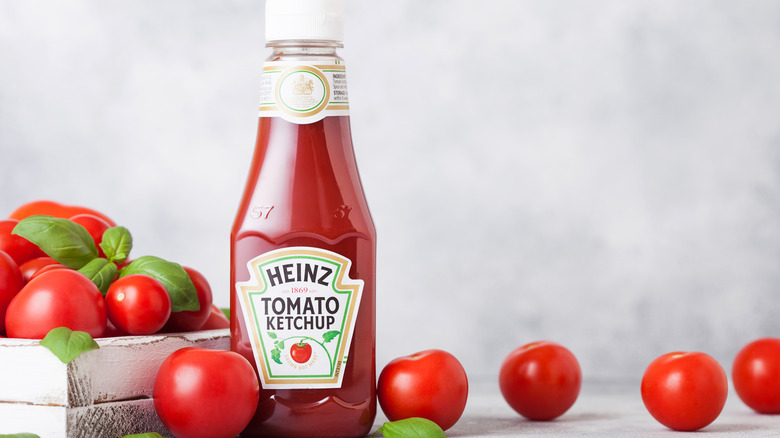The Surprising Ingredient Ketchup Was Originally Made With
Do you love ketchup? Even as adults, we've got to admit that we still enjoy this thick, sweet, and glossy sauce. It's a perfect dip for French fries and onion rings, an ideal base for homemade BBQ sauce, and a yummy glaze for foods such as meatloaf and tofu.
When you think of ketchup, what's the first ingredient that comes to mind? For us, it's tomatoes, the savory fruit that most commercial ketchup brands use as their base. Heinz, which is often ranked as the best ketchup on the market, lists tomato concentrate, distilled vinegar, corn syrup, and spices as the ingredients in its signature product. But did you know that the original ketchup was made with a different base ingredient entirely?
According to The Takeout, the word "ketchup" likely descends from the Hokkien Chinese word kê-tsiap — which wasn't tomato-based at all. Instead, it utilized fermented fish to make a strong sauce that was used sparingly to flavor dishes, rather than as a condiment. Grossed out? Intrigued? Both? The origin story of ketchup gets even better.
Origins as a fish sauce -- and lots of variations along the way
The Spruce Eats reports that ketchup was originally a fermented fish sauce. It spread across the globe as sailors toted it to different ports of call. Eventually, locals added their own ingredients to adapt the recipe. According to The Takeout, this fish sauce was likely introduced to British shores in the 17th century, when cooks adapted it using locally sourced ingredients that were also fermented, such as oysters, walnuts, and cucumbers. In fact, one of the first "ketchups" was made with salt-pickled mushrooms, according to The Daily Meal.
The condiment traveled across the globe, eventually reaching America, according to The Spruce Eats, where locals adapted it again. In 1801, Sandy Addison's "The Sugar House Book" contained a recipe for tomato ketchup that was flavored with spices, boiled down until thick, and stored long-term. And according to The Takeout, in 1876, tomato ketchup titan, Heinz released its now-famous signature sauce that graces the modern-day dinner plates of children and adults alike.

